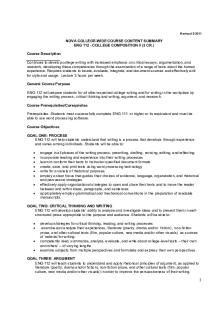Purdue OWL on Revising - College Composition I: Exploration & Authorship-An Inquiry-B How to Effectively PDF

| Title | Purdue OWL on Revising - College Composition I: Exploration & Authorship-An Inquiry-B How to Effectively |
|---|---|
| Course | College Composition I: Exploration & Authorship-An Inquiry-B |
| Institution | John Jay College of Criminal Justice |
| Pages | 8 |
| File Size | 194.6 KB |
| File Type | |
| Total Downloads | 62 |
| Total Views | 118 |
Summary
College Composition I: Exploration & Authorship-An Inquiry-B
How to Effectively Revise Research Papers...
Description
WelcometothePurdueOWL ThispageisbroughttoyoubytheOWLatPurdue (https://owl.english.purdue.edu/).Whenprintingthispage,youmust includetheentirelegalnoticeatbottom.
Contributors:JaclynM.Wells,MorganSousa,MiaMartini,andAllenBrizee. Summary: Proofreadingisprimarilyaboutsearchingyourwritingforerrors,bothgrammaticaland typographical,beforesubmittingyourpaperforanaudience(ateacher,apublisher,etc.). Usethisresourcetohelpyoufindandfixcommonerrors.
WheredoIbegin? Thougheveryonehasauniqueproofreadingprocess,therearesomegeneralstrategies thatcanbehelpfultomostwriters.Beginimprovingyourproofreadingskillsbytrying outtheguidelineslistedbelow.
GeneralStrategies Takeabreak!Allowyourselfsometimebetweenwritingandproofing.Evena fiveminutebreakisproductivebecauseitwillhelpyougetsomedistancefrom whatyouhavewritten.Thegoalistoreturnwithafresheyeandmind. Leaveyourselfenoughtime.Sincemanyerrorsaremadebyspeedingthrough writingandproofreading,youshouldtakeyourtimetolookoveryourwriting carefully.Thiswillhelpyoutocatcherrorsyoumightotherwisemiss.Alwaysread throughyourwritingslowly.Ifyoureadatanormalspeed,youwon'tgiveyour eyessufficienttimetospoterrors. Readaloud.Readingapaperaloudencouragesyoutoreadeverylittleword. Roleplay.Whilereading,putyourselfinyouraudience'sshoes.Playingtheroleof thereaderencouragesyoutoseethepaperasyouraudiencemight. Getothersinvolved.AskingafriendoraWritingLabtutortoreadyourpaperwill letyougetanotherperspectiveonyourwritingandafreshreaderwillbeableto helpyoucatchmistakesthatyoumighthaveoverlooked.
PersonalizingProofreading Inadditiontofollowingthegeneralguidelinesabove,individualizingyourproofreading processtoyourneedswillhelpyouproofreadmoreefficientlyandeffectively.Youwon't beabletocheckforeverything(andyoudon'thaveto),soyoushouldfindoutwhatyour typicalproblemareasareandlookforeachtypeoferrorindividually.Here'show: Findoutwhaterrorsyoutypicallymake.Reviewinstructors'commentsaboutyour
writingand/orreviewyourpaperwithaWritingLabtutor. Learnhowtofixthoseerrors.Talkwithyourinstructorand/orwithaWritingLab tutor.Theinstructorandthetutorcanhelpyouunderstandwhyyoumaketheerrors youdosothatyoucanlearntoavoidthem. Usespecificstrategies.Usethestrategiesdetailedonthefollowingpagestofind andcorrectyourparticularerrorsinusage,sentencestructure,andspellingand punctuation. Contributors:JaclynM.Wells,MorganSousa,MiaMartini,andAllenBrizee. Summary: Proofreadingisprimarilyaboutsearchingyourwritingforerrors,bothgrammaticaland typographical,beforesubmittingyourpaperforanaudience(ateacher,apublisher,etc.). Usethisresourcetohelpyoufindandfixcommonerrors.
FindingCommonErrors Proofreadingcanbemucheasierwhenyouknowwhatyouarelookingfor.Although everyonewillhavedifferenterrorpatterns,thefollowingareissuesthatcomeupfor manywriters.Whenproofreadingyourpaper,beonthelookoutfortheseerrors.Always remembertomakenoteofwhaterrorsyoumakefrequently—thiswillhelpyouproofread moreefficientlyinthefuture! Spelling DoNOTrelyonyourcomputer'sspellcheck—itwillnotgeteverything! Examineeachwordinthepaperindividuallybyreadingcarefully.Movingapencil undereachlineoftexthelpsyoutoseeeachword. Ifnecessary,checkadictionarytoseethateachwordisspelledcorrectly. Beespeciallycarefulofwordsthataretypicalspellingnightmares,like"ei/ie" wordsandhomonymslikeyour/you're,to/too/two,andthere/their/they're. Leftoutanddoubledwords Readingthepaperaloud(andslowly)canhelpyoumakesureyouhaven'tmissedor repeatedanywords. FragmentSentences Makesureeachsentencehasasubject.Inthefollowingsentence,thesubjectis "students":ThestudentslookedattheOWLwebsite. Makesureeachsentencehasacompleteverb.Inthefollowingsentence,"were"is requiredtomakeacompleteverb;"trying"alonewouldbeincomplete:Theywere tryingtoimprovetheirwritingskills. Seethateachsentencehasanindependentclause;rememberthatadependent clausecannotstandonitsown.Thefollowingsentenceisadependentclausethat wouldqualifyasafragmentsentence:Whichiswhythestudentsreadallofthe handoutscarefully.
RunonSentences Revieweachsentencetoseewhetheritcontainsmorethanoneindependentclause. Ifthereismorethanoneindependentclause,checktomakesuretheclausesare separatedbytheappropriatepunctuation. Sometimes,itisjustaseffective(orevenmoreso)tosimplybreakthesentence intoseparatesentencesinsteadofincludingpunctuationtoseparatetheclauses. Examplerunon:IhavetowritearesearchpaperformyclassaboutextremesportsallI knowaboutthesubjectisthatI'minterestedinit. Editedversion:Ihavetowritearesearchpaperformyclassaboutextremesports,andall IknowaboutthesubjectisthatI'minterestedinit. Anotheroption:Ihavetowritearesearchpaperformyclassaboutextremesports.AllI knowaboutthesubjectisthatI'minterestedinit. CommaSplices Lookatthesentencesthathavecommas. Checktoseeifthesentencecontainstwomainclauses. Iftherearetwomainclauses,theyshouldbeconnectedwithacommaanda conjunctionlikeand,but,for,or,so,yet. Anotheroptionistotakeoutthecommaandinsertasemicoloninstead. Example:Iwouldliketowritemypaperaboutbasketball,it'satopicIcantalkaboutat length. Editedversion:Iwouldliketowritemypaperaboutbasketballbecauseit'satopicIcan talkaboutatlength. Editedversion,usingasemicolon:Iwouldliketowritemypaperaboutbasketball;it'sa topicIcantalkaboutatlength. Subject/VerbAgreement Findthesubjectofeachsentence. Findtheverbthatgoeswiththesubject. Thesubjectandverbshouldmatchinnumber,meaningthatifthesubjectisplural, theverbshouldbeaswellandviceversa. Example:Studentsattheuniversitylevelusuallyisverybusy. Editedversion:Studentsattheuniversitylevelusuallyareverybusy. Mixedconstruction Readthroughyoursentencescarefullytomakesurethattheydonotstartwithone sentencestructureandshifttoanother.Asentencethatdoesthisiscalledamixed construction. Example:SinceIhavealotofworktodoiswhyIcan'tgoouttonight. Editedversion:SinceIhavealotofworktodo,Ican'tgoouttonight.
Parallelism Lookthroughyourpaperforseriesofitemsandmakesuretheseitemsareinparallel form. Example:Beingagoodfriendinvolvesgoodlisteningskills,tobeconsiderate,andthat youknowhowtohavefun. Editedversion:Beingagoodfriendinvolvesknowinghowtolisten,beingconsiderate, andhavingfun. PronounReference/Agreement Skimyourpaper,stoppingateachpronoun. Searchforthenounthatthepronounreplaces. Ifyoucan'tfindanynoun,insertonebeforehandorchangethepronountoanoun. Ifyoucanfindanoun,besureitagreesinnumberandpersonwithyourpronoun. Apostrophes Skimyourpaper,stoppingonlyatthosewordswhichendin"s."Ifthe"s"isused toindicatepossession,thereshouldbeanapostrophe,asinMary'sbook. Lookoverthecontractions,likeyou'reforyouare,it'sforitis,etc.Eachofthese shouldincludeanapostrophe. Rememberthatapostrophesarenotusedtomakewordsplural.Whenmakinga wordplural,onlyan"s"isadded,notanapostropheandan"s." Contributors:JaclynM.Wells,MorganSousa,MiaMartini,andAllenBrizee. Summary: Proofreadingisprimarilyaboutsearchingyourwritingforerrors,bothgrammaticaland typographical,beforesubmittingyourpaperforanaudience(ateacher,apublisher,etc.). Usethisresourcetohelpyoufindandfixcommonerrors.
SuggestionsforProofreadingYourPaper Oneofthemostdifficultpartsofthewritingprocessisproofreading.Itiseasyforusto seewhatwewanttosee,notnecessarilywhatourreaderswillsee.Thesesuggestions shouldhelpyoutakeastepbackandviewyourwritingmoreobjectively.
SuggestionsforEditing(Proofreading)yourPaper ReadyourPaperAloud Anytimeyourtextisawkwardorconfusing,oranytimeyouhavetopauseorrereadyour text,revisethissection.Ifitisatallawkwardforyou,youcanbetitwillbeawkwardfor yourreader. ExamineyourParagraphs
Examinetheoverallconstructionofyourparagraphs,lookingspecificallyatlength, supportingsentence(s),andtopicsentence.Individualparagraphsthataresignificantly lackinglengthorsufficientsupportinginformationaswellasthosemissingatopic sentencemaybeasignofaprematureorunderdevelopedthought. TrackFrequentErrors Keeptrackoferrorsthatyoumakefrequently.AskyourteacherorvisittheWritingLab forassistanceineliminatingtheseerrors. Contributors:JaclynM.Wells,MorganSousa,MiaMartini,andAllenBrizee. Summary: Proofreadingisprimarilyaboutsearchingyourwritingforerrors,bothgrammaticaland typographical,beforesubmittingyourpaperforanaudience(ateacher,apublisher,etc.). Usethisresourcetohelpyoufindandfixcommonerrors.
RevisingforCohesion Thismaterial(adaptedfromStyle:TenLessonsinClarityandGrace,byJoseph Williams)willhelpstudentsrevisesentencesforcohesion. Twoprinciples Beginsentenceswithshort,simplewordsandphrasesthat(a)communicate informationthatappearedinprevioussentences,or(b)buildonknowledgethatyou sharewithyourreader. Inaparagraph,keepyourtopicsshortandreasonablyconsistent. Exercise:Diagnosis,Analysis,Revision Diagnosis 1. Underlinethefirstfewwordsofeverysentenceinaparagraph,ignoringshort introductoryphrasessuchas"Inthebeginning,"or"Forthemostpart." 2. Ifyoucan,underlinethefirstfewwordsofeveryclause. Analysis 1. Readyourunderlinedwords.Isthereaconsistentseriesofrelatedtopics? 2. Willyourreaderseetheseconnectionsamongthetopics? 3. Decidewhatyouwillfocusonineachparagraph. 4. Imaginethatthepassagehasatitle.Thewordsinthetitleshouldidentifywhat shouldbethetopicsofmostofthesentences. Revision 1. Inmostsentences,makethetopicsthesubjectofverbs. 2. Putmostofthesubjectsatthebeginningofyoursentences.Avoidhidingyour
topicbyopeningsentenceswithlongintroductoryclausesorphrases. SamplePassage Topicsarecrucialforreadersbecausereadersdependontopicstofocustheirattentionon particularideastowardthebeginningofsentences.Topicstellreaderswhatawhole passageis"about."Ifreadersfeelthatasequenceoftopicsiscoherent,thentheywillfeel theyaremovingthroughaparagraphfromacumulativelycoherentpointofview.Butif throughouttheparagraphreadersfeelthatitstopicsshiftrandomly,thentheyhaveto begineachsentenceoutofcontext,fromnocoherentpointofview.Whenthathappens, readersfeeldislocated,disoriented,andoutoffocus. Questionstoaskyourselfasyourevise Sentences Doyoursentences"hangtogether"? 1. Readersmustfeelthattheymoveeasilyfromonesentencetothenext,thateach sentence"coheres"withtheonebeforeandafterit. 2. Readersmustfeelthatsentencesinaparagrapharenotjustindividuallyclear,but areunifiedwitheachother. Doesthesentencebeginwithinformationfamiliartothereader? Doesthesentenceendwithinterestinginformationthereaderwouldnotanticipate? Paragraphs Willyourreaderbeabletoidentifyquicklythe"topic"ofeachparagraph? Note:itiseasiertoseecoherenceandclarityinotherpeople'swriting.Why?Becauseby thetimewereachafinaldraft,everythingwewriteseemsoldtous.Improvingonthis takespractice. Contributors:JaclynM.Wells,MorganSousa,MiaMartini,andAllenBrizee. Summary: Proofreadingisprimarilyaboutsearchingyourwritingforerrors,bothgrammaticaland typographical,beforesubmittingyourpaperforanaudience(ateacher,apublisher,etc.). Usethisresourcetohelpyoufindandfixcommonerrors.
StepsforRevisingYourPaper Whenyouhaveplentyoftimetorevise,usethetimetoworkonyourpaperandtotake breaksfromwriting.Ifyoucanforgetaboutyourdraftforadayortwo,youmayreturnto itwithafreshoutlook.Duringtherevisingprocess,putyourwritingasideatleasttwice —onceduringthefirstpartoftheprocess,whenyouarereorganizingyourwork,and onceduringthesecondpart,whenyouarepolishingandpayingattentiontodetails.
Usethefollowingquestionstoevaluateyourdrafts.Youcanuseyourresponsestorevise yourpapersbyreorganizingthemtomakeyourbestpointsstandout,byaddingneeded information,byeliminatingirrelevantinformation,andbyclarifyingsectionsor sentences. Findyourmainpoint. Whatareyoutryingtosayinthepaper?Inotherwords,trytosummarizeyourthesis,or mainpoint,andtheevidenceyouareusingtosupportthatpoint.Trytoimaginethatthis paperbelongstosomeoneelse.Doesthepaperhaveaclearthesis?Doyouknowwhatthe paperisgoingtobeabout? Identifyyourreadersandyourpurpose. Whatareyoutryingtodointhepaper?Inotherwords,areyoutryingtoarguewiththe reading,toanalyzethereading,toevaluatethereading,toapplythereadingtoanother situation,ortoaccomplishanothergoal? Evaluateyourevidence. Doesthebodyofyourpapersupportyourthesis?Doyouofferenoughevidenceto supportyourclaim?Ifyouareusingquotationsfromthetextasevidence,didyoucite themproperly? Saveonlythegoodpieces. Doalloftheideasrelatebacktothethesis?Isthereanythingthatdoesn'tseemtofit?If so,youeitherneedtochangeyourthesistoreflecttheideaorcuttheidea. Tightenandcleanupyourlanguage. Doalloftheideasinthepapermakesense?Arethereunclearorconfusingideasor sentences?Readyourpaperoutloudandlistenforawkwardpausesandunclearideas. Cutoutextrawords,vagueness,andmisusedwords. Eliminatemistakesingrammarandusage. Doyouseeanyproblemswithgrammar,punctuation,orspelling?Ifyouthinksomething iswrong,youshouldmakeanoteofit,evenifyoudon'tknowhowtofixit.Youcan alwaystalktoaWritingLabtutorabouthowtocorrecterrors. Switchfromwritercenteredtoreadercentered. Trytodetachyourselffromwhatyou'vewritten;pretendthatyouarereviewingsomeone else'swork.Whatwouldyousayisthemostsuccessfulpartofyourpaper?Why?How couldthispartbemadeevenbetter?Whatwouldyousayistheleastsuccessfulpartof yourpaper?Why?Howcouldthispartbeimproved?...
Similar Free PDFs

OWL Purdue MLA formatting 2
- 66 Pages

How to Study in College 10th
- 435 Pages

Analysis on How Do I Love Thee
- 3 Pages

Guide ON HOW TO Digest A CASE
- 8 Pages

KWL Chart on Space Exploration
- 10 Pages

Owl - dffgdf
- 1 Pages
Popular Institutions
- Tinajero National High School - Annex
- Politeknik Caltex Riau
- Yokohama City University
- SGT University
- University of Al-Qadisiyah
- Divine Word College of Vigan
- Techniek College Rotterdam
- Universidade de Santiago
- Universiti Teknologi MARA Cawangan Johor Kampus Pasir Gudang
- Poltekkes Kemenkes Yogyakarta
- Baguio City National High School
- Colegio san marcos
- preparatoria uno
- Centro de Bachillerato Tecnológico Industrial y de Servicios No. 107
- Dalian Maritime University
- Quang Trung Secondary School
- Colegio Tecnológico en Informática
- Corporación Regional de Educación Superior
- Grupo CEDVA
- Dar Al Uloom University
- Centro de Estudios Preuniversitarios de la Universidad Nacional de Ingeniería
- 上智大学
- Aakash International School, Nuna Majara
- San Felipe Neri Catholic School
- Kang Chiao International School - New Taipei City
- Misamis Occidental National High School
- Institución Educativa Escuela Normal Juan Ladrilleros
- Kolehiyo ng Pantukan
- Batanes State College
- Instituto Continental
- Sekolah Menengah Kejuruan Kesehatan Kaltara (Tarakan)
- Colegio de La Inmaculada Concepcion - Cebu









